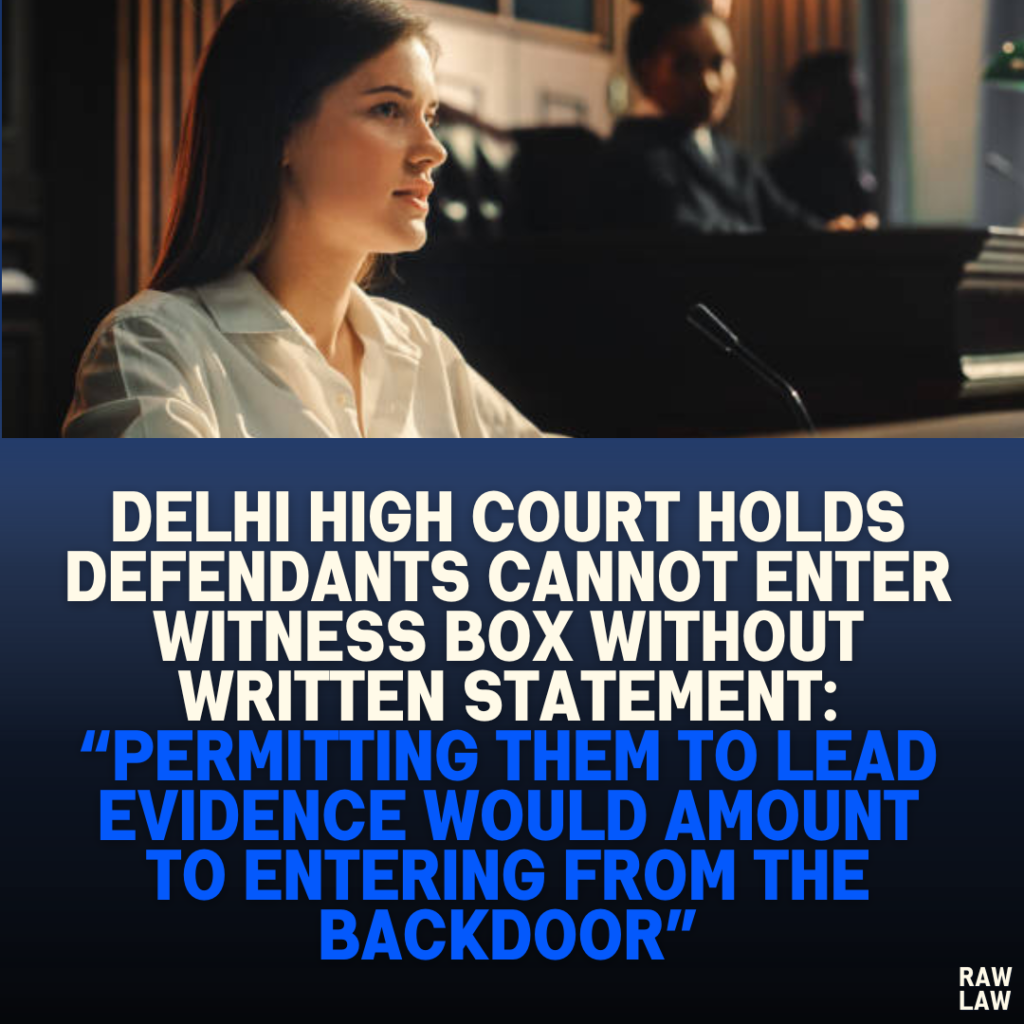Court’s Decision
The Delhi High Court set aside the order of the Trial Court which had allowed two ex-parte defendants, whose right to file written statements had been closed, to enter the witness box. The High Court held that such a move was impermissible in law, especially when there were no pleadings by the defendants.
“The impugned order whereby the learned Trial Court has given them such right has, virtually, permitted them to enter into the suit from backdoor, which is not permissible in the eyes of law.”
The High Court clarified that these defendants retained only a limited right to participate—specifically to address final arguments and file written submissions—but could not be allowed to lead evidence.
Facts
- The petitioner had filed a commercial suit for recovery against four defendants.
- All four defendants were proceeded against ex parte.
- Two of the defendants (No. 2 and No. 3) failed to file written statements within the permissible 120 days, and their right to do so was closed by the Trial Court.
- The Trial Court later allowed these two defendants to participate from that stage forward and ultimately permitted them to enter the witness box to prove allegations of fraud against their co-defendants.
- This permission was challenged before the High Court.
Issues
- Whether defendants who were proceeded ex parte and whose right to file written statements had been closed could be permitted to enter the witness box to lead evidence?
- Whether the Trial Court committed an error in granting such permission without the existence of pleadings?
Petitioner’s Arguments
- The petitioner contended that once the right to file a written statement is closed, the concerned defendant loses the right to lead evidence.
- The petitioner argued that such defendants may only:
- Conduct limited cross-examination of plaintiff’s witnesses; and
- Address final arguments.
- It was submitted that allowing them to lead evidence despite no pleadings was a legal error and contrary to well-settled principles.
Respondent’s Arguments
- The respondents (Defendant Nos. 2 and 3), appearing via video conferencing, admitted that they had not filed any written statements.
- They contended they were victims of fraud perpetrated by their co-defendants and needed to establish this in evidence.
Analysis of the Law
- The High Court emphasized the legal principle that evidence can only be led in consonance with pleadings.
- Since Defendant Nos. 2 and 3 had no written statements on record, there were no pleadings that could be supported or expanded through oral evidence.
- The Court reiterated that any party who has not submitted a written statement cannot introduce a defense through testimony.
Precedent Analysis
- While no specific precedents were cited, the Court relied on general principles of civil procedure law—particularly the idea that pleadings form the foundation for evidence and trial.
- The power of the court to call any person as a witness under Order XVI Rule 14 CPC was acknowledged but found to be inapplicable here, as it had not been invoked.
Court’s Reasoning
- The High Court noted that the Trial Court had erroneously followed a routine course of listing the matter for defendants’ evidence, without accounting for the fact that their written statements were not on record.
- It was observed that allowing the defendants to lead evidence in the absence of pleadings would effectively allow them to re-enter the suit from the “backdoor.”
- The proper course for the defendants would have been to challenge the order that closed their right to file written statements. Since they failed to do so, they could not now be allowed to lead evidence.
Conclusion
The High Court allowed the petition, holding that Defendant Nos. 2 and 3 could not be permitted to enter the witness box. It reaffirmed that their rights were limited to addressing final arguments and filing written submissions, but not leading evidence.
Implications
This judgment reinforces the fundamental procedural rule that pleadings are a prerequisite to leading evidence. It affirms that parties who default in filing written statements cannot bypass procedural bars under the guise of alleging fraud or any other defense, unless they first cure the procedural defect by legally challenging the closure of their right.
The ruling will serve as a precedent for similar cases where parties seek to introduce a defense without any pleadings on record, thereby strengthening procedural discipline in civil trials.
